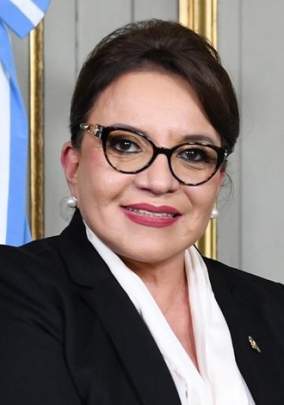China in Central America
Monday, April 3, 2023
Written by Laurence F Sanford, Senior Analyst ASCF
Categories: ASCF News ASCF Articles

The Chinese Communist Party (CCP) is increasing its social, economic, and strategic footprint in the Central American countries of Guatemala, El Salvador, Belize, Honduras, Nicaragua, Costa Rica, and Panama. The United States and democracies are fading away while socialism/communism is rising and encircling the West.
Honduras
In March 2023, Honduras switched diplomatic recognition from the Republic of China (ROC-Taiwan) to the People's Republic of China (PRC). This leaves only Belize and Guatemala in Central America, which still recognize ROC.
Honduras President Xiapomara Castro, inaugurated in January 2022, vowed to establish a “democratic socialist” state. Castro campaigned on an agenda to alleviate poverty and corruption. One of her first actions was allowing her predecessor President Hernandez to be extradited to the U.S. for alleged drug trafficking. Shortly after recognizing the PRC, President Castro said she would be traveling to China “soon.”
The increased CCP political presence is the result of expanding business relationships and money in the form of infrastructure loans and bribery to elite leaders. It is a multi-pronged approach over two decades involving millions of loan dollars through the Belt and Road Initiative (BRI), diplomatic pressure for increased trade, and commonality of belief in Marxism. China has risen from poverty, so maybe the Chinese system should be emulated.
If a government leader wants a high-profile project with his/her name on it, you go to China, states Margaret Myers, director of the Asia and Latin America Program at the Inter-American Dialogue, a U.S.-based think tank. Favorite infrastructure projects are large sports stadiums and dams financed by China with opaque loan terms. (Most Chinese loans are hidden from public review.) Honduras has approximately $8 billion in foreign debt.
Castro is also threatening to expropriate nearly $100 million in American investments in “special economic zones” (SEZ). Inaugurated in 2013 as an amendment to the Honduran constitution, the SEZs objective was to uplift Honduras economically to the level of Singapore. Castro is attempting to change the constitution to remove U.S. investor protections despite a 50-year protection clause backed by a free trade agreement treaty.
El Salvador
El Salvador’s president, Nayib Bukele, has stated that the United States has lost the arguments of “democracy” and “free and fair elections” or trying to condemn “political persecution” with the jury indictment of former President Donald Trump…
Bukele has purged the judicial system, suspended constitutional rights, and launched an offensive against MS-13 and other gangs. He opened a new 40,000-man capacity prison to house a portion of the nation’s 65,000 prisoners. The U.S. government has condemned his actions and compared Bukele to the late Venezuelan leader Hugo Chavez. Bukele has a 90% approval rating with Salvadorans for his crackdown on criminals.
MS-13 originated in the 1980s in Los Angeles, California, to protect Salvadoran immigrants from other immigrant gangs. It has since morphed into an international crime syndicate noted for its cruelty. Many Salvadorans had fled a brutal civil war that ended in 1992 between the military and left-wing FMLN guerilla groups.
Meanwhile, China has donated $500 million to build a seven-story library in the heart of the nation’s capital, San Salvador, a 50,000-seat sports stadium, and two water treatment plants. China has nothing but praise for Bukele, and Bukele has nothing but praise for China’s President Xi Jinping. China does not comment on human rights abuses by other countries. (Why would they considering their own human rights atrocities?)
El Salvador receives Chinese monies but is attempting to balance its relations with the United States. Over 20% of GDP comes from U.S.-sourced remittances, and trade is an important factor in the economy. Lastly, Salvadorans have millions of personal relationships with the U.S.
Summary
The plot is the same - China spends billions on opaque loans to fund high-profile projects to gather goodwill, bribes local elite leaders, works with security forces, and develops trade that invariably is in China’s favor. The intermediate goal is to encircle the West with China-friendly and subservient countries and tie down the West (see “Gulliver Travels”'). The ultimate goal is world domination.
The United States has to promote trade and educate Latin American citizens about the dangers of Chinese monies and Faustian bargains made with BRI and other opaque loans. The U.S. should not criticize authoritarian leaders, especially in view of what is happening in the U.S. The woke, gay, and transgender agendas in the U.S. are not well received in Latin America or most of the world and should not be promoted. (Flying the gay flag at U.S. embassies worldwide!)
The United States should mount major media outreach programs throughout the world promoting American values of life, liberty, and the pursuit of happiness. Be selective with foreign aid disbursements - why send money to Marxist countries, including China?
Articles on Nicaragua, Costa Rica, and Panama are to follow.
Peace Through Strength
Laurence F. Sanford
Senior Analyst
American Security Council Foundation
www.ascf.us




